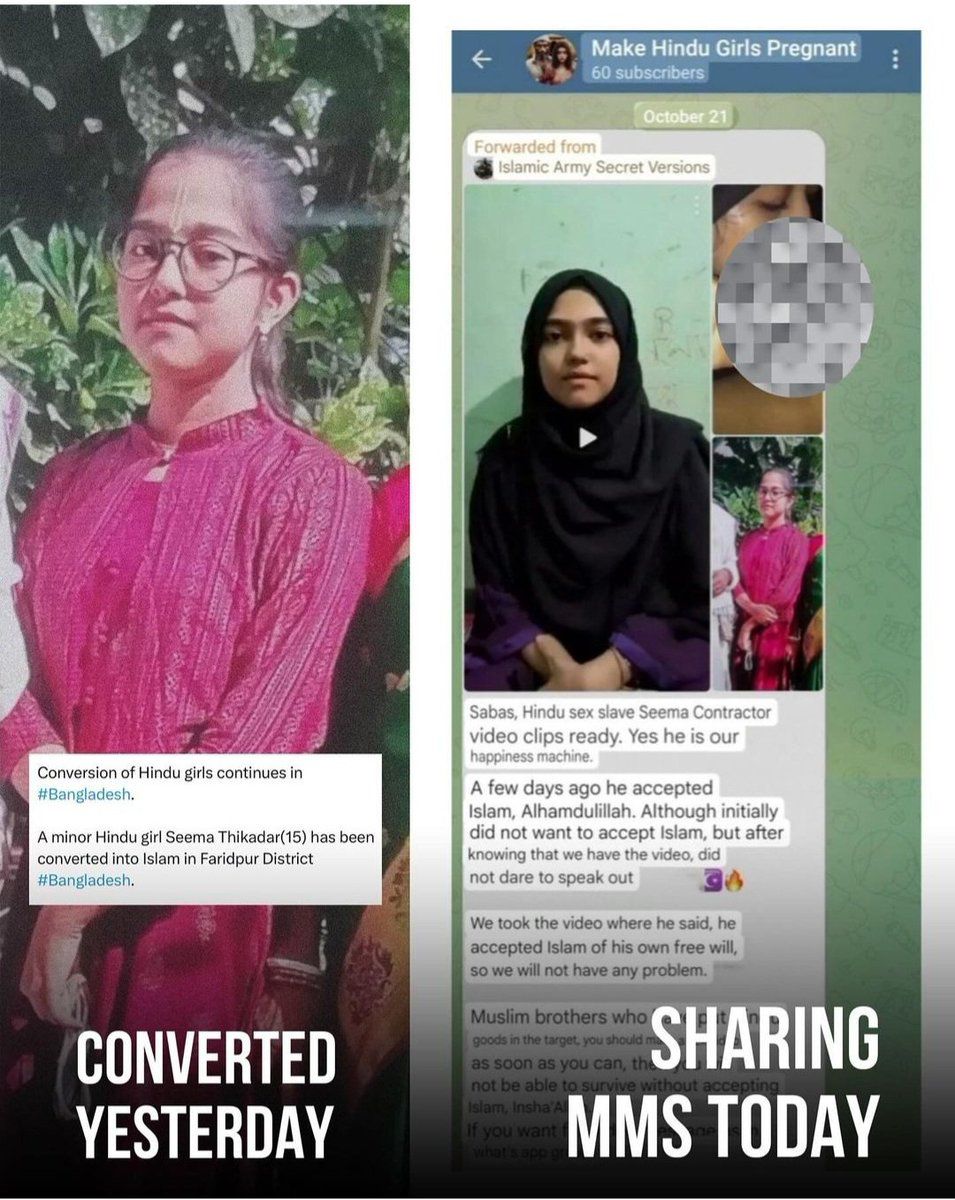
The case of Seema Thikadar, a 15-year-old Hindu girl from Bangladesh, has recently drawn widespread attention and concern due to the alarming circumstances surrounding her forced conversion to Islam.
This incident not only highlights the ongoing issues of religious intolerance and the exploitation of minors but also raises critical questions about the societal and legal frameworks that allow such tragedies to occur.
Background
Seema Thikadar’s situation came to light when reports surfaced that she was groomed, abducted, and subsequently coerced into converting to Islam. The catalyst for this forced conversion appears to be a leaked sextape, which was used as a tool for blackmail against her.
The video reportedly circulated widely on social media, leading to severe emotional distress for Seema and her family.
The Role of Blackmail
The use of blackmail in this case is particularly troubling. According to various reports, individuals who possessed the incriminating video threatened Seema’s family, demanding that she convert to Islam or face dire consequences. This tactic of coercion is not uncommon in cases involving vulnerable individuals, especially minors, who may feel trapped and powerless in the face of such threats.
The Conversion Incident
On October 22, 2024, it was reported that Seema publicly announced her conversion to Islam. This announcement was met with skepticism by many observers who questioned whether it was truly voluntary or a result of the intense pressure she faced.
The video of her conversion has been circulated online, further complicating the narrative surrounding her situation. Critics argue that a minor, particularly one subjected to such trauma, cannot genuinely consent to a religious conversion under these circumstances.
In Seema’s case, VoBH posted a fake message on one of their channels, pretending to be Islamists, which read:
“Well done! Hindu sex slave Seema Thikadar’s video clip is ready. Yes, she is our happiness machine. A few days ago, she accepted Islam, Alhamdulillah. Initially, she resisted, but after learning we had a video, she didn’t dare to speak out. We recorded her saying she accepted Islam of her own free will, so we won’t have any problems now.
Muslim brothers who have targeted Hindu goods, make a sex video as soon as possible. Once it’s done, she won’t be able to refuse Islam. If you want the full video, message us on WhatsApp.”
They attached a random internet video clip with the staged message, and later translated the message with the help of google lens and spread it on X ,and now many Hindutva social media handles amplified this false claim.
In reality, no such video of Seema Thikadar exists. She married the boy and now living with him.
A similar tactic was used last August when they spread a fabricated story of a Hindu girl being raped, which quickly went viral in India. They posted an old video from Bengaluru, alongside a fake message from supposed Islamists celebrating the incident. The message read:
“Alhamdulillah! This is how Hindus should be taught. All Hindus are Indian agents. During the protests, 4/5 of our brothers raped a Hindu girl from Dhaka University.
If you want the full video, message us on WhatsApp. Rape the Hindu girls around you, and soon all Hindus will flee to India. Wait, and you’ll see the new government rape your sisters in the streets, Malaun group.”
By using these fake Telegram groups, VoBH perpetuates hatred and falsely fuels anti-Muslim sentiment in India.
The Hindutva propaganda machine will stoop to any level, even creating fake channels like Make Hindu Pregnant being
Public Reaction
The incident has sparked outrage both locally and internationally. Many activists and organizations have condemned the forced conversion as a violation of human rights and an example of systemic issues within Bangladeshi society regarding the treatment of religious minorities.
Social media platforms have seen an influx of posts highlighting Seema’s plight, with hashtags calling for justice and greater protections for vulnerable individuals.
Societal Implications
Seema’s case is not an isolated incident but rather part of a broader pattern observed in Bangladesh where Hindu girls are often targeted for forced conversions. Reports indicate that these cases frequently involve elements of grooming and exploitation, raising alarms about the safety and rights of minority communities in the country.
Legal Framework
The legal protections for minors in Bangladesh are often inadequate when it comes to issues of forced conversion and sexual exploitation. While there are laws intended to protect children from abuse, enforcement is inconsistent, and many victims find themselves without adequate support or recourse.
This gap in legal protection contributes to a culture where such abuses can occur with relative impunity.
The Need for Awareness and Action
The situation surrounding Seema Thikadar underscores the urgent need for increased awareness regarding the rights of minors and religious minorities in Bangladesh. Advocacy groups are calling for:
- Stronger Legal Protections: There is a pressing need for laws that specifically address forced conversions and provide robust protections for minors.
- Support Systems: Establishing support systems for victims of blackmail and exploitation can help them regain control over their lives.
- Public Awareness Campaigns: Educating communities about the rights of individuals, especially minors, can empower them to resist coercive tactics.
Conclusion
The case of Seema Thikadar is a heartbreaking reminder of the vulnerabilities faced by young individuals in societies marked by religious intolerance and exploitation. As discussions continue around her situation, it is crucial for stakeholders—governments, NGOs, and community leaders—to work collaboratively towards creating an environment where such abuses are not tolerated.
Ensuring the safety and rights of all individuals, regardless of their religious background, is essential for fostering a more just and equitable society.







